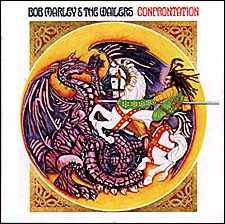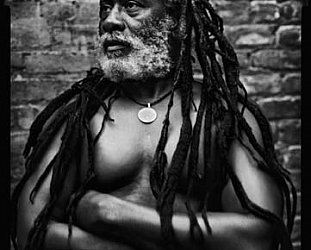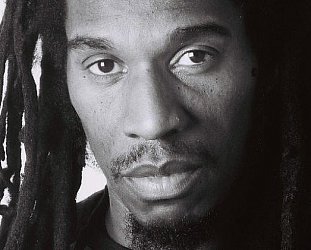Graham Reid | | 9 min read

There are no written records of the event, but we can speculate: the interior of the Tuff Gong Studio in Jamaica on a hot afternoon in 1980. Bob Marley and the Wailers are putting the final tracks together for the album to be called Uprising.
Urged on by Chris Blackwell, boss of Island Records, Marley has gone back into the studio to add something more. He is sitting alone with his acoustic guitar, the tapes roll and in a voice which seems to come from ages past, he sings.
It is Redemption Song, a moving testament of optimism in the context of slavery days. As it turns out, it is also the last song on the last album to be issued in Marley’s lifetime.
Within a year – on May 11, 1981 – his lifeless cancer-riddled body was lying in a hospital in Miami, a few short kilometres over the ocean from his home in Jamaica. The man who did not acknowledge death was gone.
“Don’ cry,” he apparently said to this mother, Ciddy Marley, as she stood at his bedside in the fading hours. “I’ll be all right. I’m gwan ta prepare a place.”
When artists die it is natural to focus on their last work and to speculate. The deaths of Jim Morrison and Sid Vicious were sad, but both seemed largely washed out. Presley’s death was no less tragic simply because he didn’t seem to have much left to give.
Lennon? Who knows?
Jimi Hendrix and Buddy Holly certainly seem taken well before their time.
And Marley.
Despite the title, Uprising was an album of often melancholy, world-weary songs. Marley does sound tired.
Now, as the 10th anniversary of his death comes around, there are those who would ask what might he have done.
Because there was no typical Marley album however, Uprising could be emblematic of nothing in his career. He would write an album of immense political power like Exodus in ’77 and follow it up with a mellow easy-skank collection like Kaya the next year. Uprising was a final album in a career which deserved other albums.
Yet unlike most dead artists, very little seeped out over the subsequent years. Chris Blackwell of Island, loathe to be accused of cashing in on the death of a friend, waited two years before releasing the first (and until recently) only posthumous Island/Marley album, Confrontation.
But this year is different, the 10th anniversary - and already there has been the extraordinary Talkin’ Blues album of previously unreleased material made available. Island Records are promoting the whole back catalogue on CD and talk in terms of “re-presenting” Marley.
Back home in Jamaica his birthday, February 6, was declared Bob Marley Day and a national holiday. The Jamaica Tourist Board is using his song One Love as the theme for their 1991 promotional campaign.
Bob live.
Yet, as most already know, there are muddied waters around the legacy of Bob Marley, the man who left no will because the material world was of little interest to him. He was about his Father’s business, as he often said. He read scripture every day, followed strict dietary laws, and left a legacy of chaotic business affairs which have bounced back and forth between the Jamaican Court of Appeal and the Privy Council.
Yet away from the unsympathetic glare of media interest the legacy of Marley is steadily being sorted out by his old friend, Neville Garrick, who was art director for the singer’s Tuff Gong label and is at the helm of a big business.
A graduate of UCLA, Garrick returned to Jamaica from California in 1973. A disciple of radical black activist Angela Davis and founder member of the Black Central Committee movement at the university, Garrick had experience in publishing student magazines.
He returned to Jamaica to work for the Jamaica Daily News, a tabloid set up in opposition to the long-established Daily Gleaner. But within the first year back home he had made the acquaintance of Marley after seeing the singer at a benefit concert with Marvin Gaye.
When Marley upstaged Gaye, Garrick says he knew this artist - whose work he had loved since a teenager - was poised for greatness. He began producing posters for Tuff Gong, then album covers, and travelled with the group when it toured.
It is a measure of his closeness to Marley that after the shooting attempt on the singer’s life in November ’76 it was to his house, provided by Blackwell, at Strawberry Hill to which Marley fled.
These days Garrick is the keeper of the flame.
“Yes, the buck stops with me,’ he says from his home in Jamaica. “I am executive director of The Marley Foundation, whatever that [title] means. ‘Keep off the shrine.’ ”
The idea of the foundation, he says, is to continue the legacy in a positive way.
“Since his passing a lot of dirty linen has been washed as people scramble over control of his estate. Pirates were having a field day bootlegging records and merchandising his likeness and image without permission.
“We have now cleaned up all that and have licensed approved designs. But mainly the foundation works to provide a base income in perpetuity for all Bob’s heirs and successors. Thirty per cent of assets and royalties go to them.
“We are also supporting organisations and treating events we feel Bob himself would have wanted to be aligned with. For example, we donated $25,000 to the African National Congress [ANC] after Nelson Mandela toured New York.
“Amnesty International would seem to revere Bob somewhat in that they sometimes end concerts with his music, so we have created the Bob Marley Fund within that human rights association. Island Records, on behalf of the foundation, gives $50,000 per annum for the next 10 years to be used specifically in the area of human rights in the Third World.”
Garrick outlines other projects as well. Curtis Mayfield who was a major influence on Marley and (whose People Get Ready was incorporated into Marley’s One Love) was given $10,000 to assist his rehabilitation after an accident. Money has been given to rebuild as Ethiopian Orthodox Church of which Marley was a member. It was destroyed in Hurricane Gilbert in 1988.
At last it looks like some order is being put into Marley’s affairs when things had been very messy. At one point Rita Marley was accused of falsifying a will, and when a statue of Marley was erected in Kingston in 1983 Rastafarians pelted the sculpture with rocks because it wasn’t a sufficiently good likeness.
Only a year ago the house where Marley was born lay abandoned. Today it is being restored and Rita Marley has put her considerable generosity and personal charisma behind the creation of the Bob Marley Museum at 56 Hope Road, where Marley lived in a loose commune for many years.
Later this year, Garrick says, there should be a 100-song box set of Marley music, although he won’t be drawn on whether it will include more unreleased material. It is still in the planning stages, as are major festivals in commemoration.
An event proposed for February 6, to establish a Bob Marley Scholarship fell through because Ziggy Marley, one of Bob’s children, wasn’t available to perform. But May 11 should see a huge concert where Marley’s music will be performed by everyone from ex-Wailer Bunny Livingstone to big bands and folk singers.
“Anything can happen with music” Marley once said.
It is little wonder Marley is such as enchanting figure. The circumstances of his birth - a liaison between a Jamaican woman from the parish of St Ann and a British captain of a fading empire – conjoined two worlds.
Marley lived in a land where the spirit world existed alongside the material, and ghosts (duppies) were no less a threat in the hill country where he was born than the rude boy street gangs of Trenchtown where he lived in his teenage years. Marley was a duppy conqueror and rude boy himself.
Jamaica was, and still is, land of intense religiosity. Traditional beliefs penetrate Ethiopianism which in turn attaches itself to the back-to-Africa philosophy of Marcus Garvey and the Rastafarians. Marley was part of all these too.
And Jamaica is also a land where older remnants of the English language are still in use, much like Ireland and Scotland. Worlds like sherrif, as in I Shot the Sherrif still retain a living meaning. (“I wanted to say ‘I shot the police‘ but the Government would have made a fuss,” said Marley. “It’s the same idea; justice”). On the Talkin’ Blues album are snippets of Marley’s voice. He calls a flute a “fife.”
On top of that cultural stew Marley was also possessed of one overriding characteristic. He was charismatic.
“Bob was the most important person in my life,” says Neville Garrick. “I take it as a privilege to be a spokesman for Bob after his death. In my life I have worked with two great people, Angela Davis and Bob Marley. That has been a gift for me.”
With all those conjunctions Marley could hardly fail – except he was black, poor and living on an island in the middle of the Caribbean yet as he ascended from the street he took a whole audience with him, and perhaps that was why he was particularly revered in this country.
His message of self- pride, dignity and “don’t know ya past don’t know ya future” struck a deep chord.
It is little surprise that one of the best interviews Marley gave – arguably the best – was in Auckland with Dylan Taite of TVNZ.
“It was in New Zealand Marley said reggae would get bigger and bigger until it finds its rightful people, says Garrick. “That is still true. And when you are flesh you remain a threat. That is why these honours come for Bob now. He can still harm the system with his message, but he can’t have his flesh punished any more. Now there are Marley tributes all around the world.”
Ironically however, although Marley is held in high regard in New Zealand, the new Talkin’ Blues album hasn’t crashed into the charts as yet – despite unanimous critical acclaim.
Can Marley be “re-presented”? His message wouldn’t seem to have become irrelevant in the past decade.
Maybe Marley just isn’t cool right now? Maybe he represents the concerns of an earlier generation?
That is certainly true in Jamaica where Garrick says younger people don’t have the depth of understanding about who he was or what he stood for. Even the Rastafarians are not quite as visible as they once were.
“But that is more recognition by the system that they are not a revolutionary group. They have been assimilated and have come a long way from being hunted and trimmed by the police.
“Bob being such a focal point of the movement, it was natural some people would focus on him rather than Rasta, and cut off their hair when he passed on. There are dreadlocks around still, especially in Trinidad, where it is more like what Jamaica was in the 70s. So some of it is still happening, it all goes on.”
But while Garrick is overseeing various activities like a touring Marley photographic exhibition which opens in London next week, he is also mindful of some of the sharp criticisms there are around concerning the handling of Marley’s estate.
The institutionalisation of Marley, a man who stood against the kinds of dollar-earning systems now being set up, sounds like commerce and the big dollar. The Babylon System in fact.
“I have had no direct criticism,” says Garrick, “and anyway I could defend it. We are involved in projects which generate capital. We are not building up Babylon and I don’t share the criticisms made of Chris Blackwell either.
“A lot of people have been talking and talking about what to do for Bob and he is the only one who has actually done anything. I’m not saying he doesn’t have any faults and I might be wrong about him. He could have made five times the money out of Bob, but he has opted for doing something long and lasting because he’s a big fan.”
Something long as lasting is what Rita Marley also feels is important.
“We came from nothing,” she said last month, “from the raw poverty of Trenchtown. What Bob and I had was something special that God ordained, it was as if we had to do something for our people, to become a symbol for our time and that feeling is still going on – no matter what.”
So on the 10th anniversary of Marley’s death the symbol of pride without arrogance, a gentle but fierce warrior, natural mystic and soul rebel is being revived again. All different aspects of a complex character...and great music.
Writing about Jimi Hendrix recently, English rock journalist Bill Graham warned about reducing the revival industry to a sample-able cliché, reproducible mannerism and tidy greatest hits packages.
The Marley industry seems at least to be presenting the broad picture, all the contradictions, and keeping the music intact. Questions about Babylon System will be debated. Accusations thrown. Voices raised.
“Any time you can’t laugh you’re foolish,” Bob Marley once said. “Tension get you mash.”







post a comment